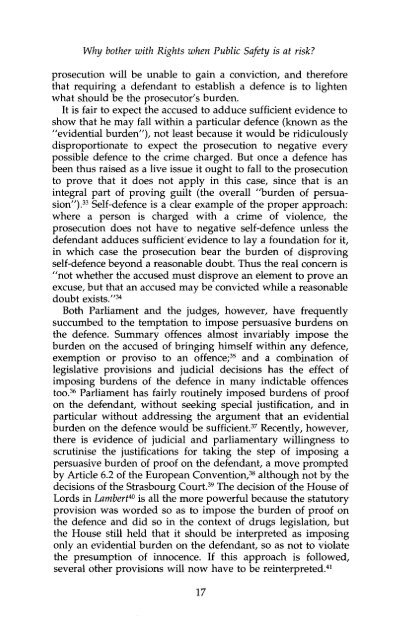Human Rights, Serious Crime and Criminal Procedure - College of ...
Human Rights, Serious Crime and Criminal Procedure - College of ...
Human Rights, Serious Crime and Criminal Procedure - College of ...
- No tags were found...
You also want an ePaper? Increase the reach of your titles
YUMPU automatically turns print PDFs into web optimized ePapers that Google loves.
Why bother with <strong>Rights</strong> when Public Safety is at risk?prosecution will be unable to gain a conviction, <strong>and</strong> thereforethat requiring a defendant to establish a defence is to lightenwhat should be the prosecutor's burden.It is fair to expect the accused to adduce sufficient evidence toshow that he may fall within a particular defence (known as the"evidential burden"), not least because it would be ridiculouslydisproportionate to expect the prosecution to negative everypossible defence to the crime charged. But once a defence hasbeen thus raised as a live issue it ought to fall to the prosecutionto prove that it does not apply in this case, since that is anintegral part <strong>of</strong> proving guilt (the overall "burden <strong>of</strong> persuasion").33 Self-defence is a clear example <strong>of</strong> the proper approach:where a person is charged with a crime <strong>of</strong> violence, theprosecution does not have to negative self-defence unless thedefendant adduces sufficient'evidence to lay a foundation for it,in which case the prosecution bear the burden <strong>of</strong> disprovingself-defence beyond a reasonable doubt. Thus the real concern is"not whether the accused must disprove an element to prove anexcuse, but that an accused may be convicted while a reasonabledoubt exists." 34Both Parliament <strong>and</strong> the judges, however, have frequentlysuccumbed to the temptation to impose persuasive burdens onthe defence. Summary <strong>of</strong>fences almost invariably impose theburden on the accused <strong>of</strong> bringing himself within any defence,exemption or proviso to an <strong>of</strong>fence; 35 <strong>and</strong> a combination <strong>of</strong>legislative provisions <strong>and</strong> judicial decisions has the effect <strong>of</strong>imposing burdens <strong>of</strong> the defence in many indictable <strong>of</strong>fencestoo. 36 Parliament has fairly routinely imposed burdens <strong>of</strong> pro<strong>of</strong>on the defendant, without seeking special justification, <strong>and</strong> inparticular without addressing the argument that an evidentialburden on the defence would be sufficient. 37 Recently, however,there is evidence <strong>of</strong> judicial <strong>and</strong> parliamentary willingness toscrutinise the justifications for taking the step <strong>of</strong> imposing apersuasive burden <strong>of</strong> pro<strong>of</strong> on the defendant, a move promptedby Article 6.2 <strong>of</strong> the European Convention, 38 although not by thedecisions <strong>of</strong> the Strasbourg Court. 39 The decision <strong>of</strong> the House <strong>of</strong>Lords in Lambert 40 is all the more powerful because the statutoryprovision was worded so as to impose the burden <strong>of</strong> pro<strong>of</strong> onthe defence <strong>and</strong> did so in the context <strong>of</strong> drugs legislation, butthe House still held that it should be interpreted as imposingonly an evidential burden on the defendant, so as not to violatethe presumption <strong>of</strong> innocence. If this approach is followed,several other provisions will now have to be reinterpreted. 4117
















